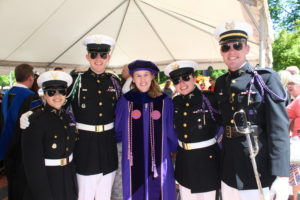Haley Griffiths Earns First-Ever Recreational Therapy Ph.D. through Clemson University’s Parks, Recreation and Tourism Management department
Haley Griffiths, the first student to earn a Ph.D. through Clemson University’s new online recreational therapy cognate area doctoral program, doesn’t appear to be able to slow down. She only recently found the time to really look back on her studies during a long overdue family holiday just after she defended her dissertation.

Like many students in online graduate programs, Haley worked full-time while she studied. She spent her days working with psychologists, social workers, counsellors and inmates as the only recreational therapist at a nearby prison, and spent many of her evenings, weekends and summers in the air, keeping up with her required flying hours with the National Guard. All National Guard pilots are required to get in 48 hours of flight time every six months, whether or not they’re on active duty.
Haley decided to pursue her Ph.D. after working as an adjunct professor for the University of Tennessee, and realizing she wanted more. “Although I was already teaching with my master’s degree, I wanted to work in academia full-time,” Haley says. “To do that, I needed a Ph.D.”
The online format worked well for Haley, who says that keeping to a schedule, working on assignments early and taking advantage of the support of her fellow students was key. “I didn’t want to miss a deadline because I was called in [by the Guard],” Haley explains. “Planning and organization helped me be able to look ahead, so if I was helping to fight fires, I didn’t fall too far behind.”
Marieke Van Puymbroeck, Ph.D. and program coordinator for the recreational therapy program, says Haley was well equipped to take on so many different responsibilities at once. “The best way to describe Haley is steadfast. She has nerves of steel,” Van Puymbroeck says. “Working as a recreational therapist in a prison, and flying for a medical evaluation unit, require grit and resilience. She has those qualities in abundance.”
Resilience is also a central focus of Haley’s research, which explored how summer camps targeting military youth and families influence their resilience and development. Camp experiences targeting youth in military families have long been seen as promising interventions for building healthier families and resilience in their youth participants, but rigorous research into these experiences was limited.
Haley sought to fill this research gap. She found that bringing youth in military families together into a camp environment was beneficial, though their resilience remained unchanged – findings she wants to explore in greater detail.
“Although their resilience remained constant, we also found that bringing together campers with shared experiences helped them experience a sense of belonging – or relatedness – that may not have been possible back home, where they are likely the only kids in their school with deployed parents,” says Haley. “I would like to understand and unpack more about resilience, and what it means, especially to this group of people.”

Haley’s resilience is about to be put to the test, as she heads to Kosovo this summer to fly a Blackhawk helicopter for a medical evacuation unit. When she’s completed her deployment, she plans to look for a faculty position in the recreational therapy field, while continuing to serve.
“Serving in the National Guard, and being able to serve my community, is something I really love,” says Haley. “It’s challenging and exciting, but also really rewarding.”
